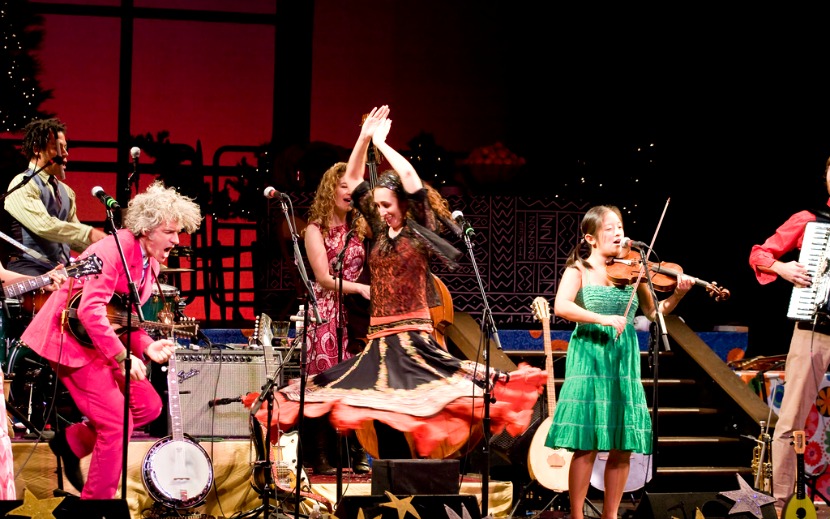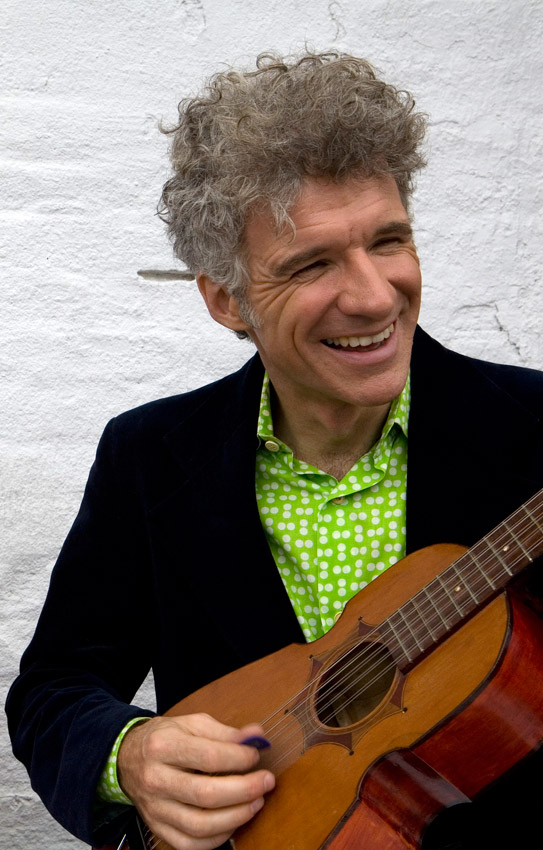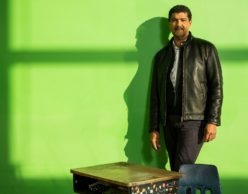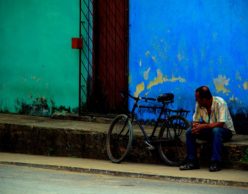Dan Zanes: One Conversation Changed My Life

Grammy Award Winner Dan Zanes is a musician, educator, and leader of the innovative all-ages family music band, Dan Zanes and Friends. He’s also trying to make the world a better place through music and conversation. He shared with us his journey from living in a sheltered all-white world to a Mash-Up America. Hint: Listening to Chuck Berry doesn’t make you multicultural.
Make sure to check out Dan’s 12 tips for living a less racist life.
A conversation with a white guy changed how I looked at my life.
A couple years back, I called my childhood friend Mike to check in and catch up. My career had taken a turn from rock and roll to family music, and I wanted to tell him about a show I had just played at a local public school in my Brooklyn neighborhood. The student body was a great mix — Black, Latino, Arab, and white kids. I had chosen songs from lots of different cultures to reflect them and I was pretty fired up by the diversity.
He asked who else was in the band and I told him about the two guys who had accompanied me, musical dads I knew from the local playground.
Were they white?
Well, sure.
Mike asked how the students related to us, three white guys.
They were cool. We had played songs from a variety of traditions in an effort to acknowledge the diversity of Brooklyn. I was uplifted and it seemed like the kids were too.

Mike kept pressing. He asked if I thought the Black girls in the audience had the same reaction and emotional connection to the group as the white boys did. I said I didn’t know. I wasn’t even sure why he was asking that question!
Honestly, that was a dynamic I’d never even considered. It was true the people onstage with me were always white, but those were the circles I traveled in. Singing songs from a variety of traditions seemed like the important thing, even if it was white people up there singing. Mike threw out a few more questions, and eventually I began to see his point. If I’m onstage with two white guys, how are kids of color going to fully identify with the music, regardless of our multicultural song selection?
Not just that, but it’s quite likely that I was reinforcing the old message that this is a white person’s world. And here we come to tell you about some of the songs that your people sang!
I still think about that talk with Mike because, simple as it was, it changed my life. It brought me into a conversation I’d never been a part of before — the conversation about racism and my role in it as a white guy.
I knew that Mike had been doing diversity training, or anti-bias training, or anti-racist training, or whatever it was called, with Beverly Daniel Tatum, the author of the “Why Are All The Black Kids Sitting Together in the Cafeteria: And Other Conversations About Race,” and I had imagined that he was working with people who were racist. That certainly didn’t have much to do with me!
Of course bigoted people existed (mostly in the South, I assumed) but I came from a Protestant tradition of social involvement. I was a musician performing songs from a wide variety of cultures for kids and grown-ups. I was an NPR-listening-New-York-Times-reading liberal! I didn’t have a problem with people of color. How could I? Chuck Berry was my favorite guitar player!
I was an NPR-listening-New-York-Times-reading liberal! I didn’t have a problem with people of color.
Sure, I grew up in New Hampshire, where groups composed entirely of white people doing anything was not only common, it was all I knew. Once I left that environment, I went to Boston and wasted my youth in a rock and roll band — for me, it was yet another very white experience. In New York, my friends were pretty much all white. I lived in a white neighborhood, sent my daughter to a majority white school, consumed white media, and ate in white-owned restaurants. So when the time came, I didn’t think twice about performing in a diverse public school auditorium with two white guys who looked like me. Kids need music and here it is, I thought. We’re not racist. Quite the opposite. We’re doing something good! Hey, we’re doing it right, we’re singing a multicultural collection of songs!
But going into that performance as a white person with no awareness of the racial dynamics, it’s totally possible that I did more harm than good.
In reality, I had no idea that what Mike was doing with Beverly was not about individual racists, necessarily, but about a system that was created hundreds of years ago to benefit people who look like me.
Since that day, we’ve had many, many more conversations about racism, white privilege, white supremacy, white cultural dominance, white isolation, white fear, racial identity, and cultural identity … as well as The Grateful Dead, our kids, and ridiculous things we did as teenagers.
It’s not easy being asked hard questions about your own privilege and lifestyle. But I didn’t feel like I was being attacked or judged, for a couple reasons. One, I’ve known Mike since I was 15 years old, and our level of trust was very high. If I remember correctly, we were high for much of the time! Two, I wasn’t being told what to do. Mike was asking me questions about myself, and it was the first time I’d been asked by a white guy to think about what it meant to be a white guy.
In a sense, it was a very loving act. As white people, we’re taught in a variety of subtle and not so subtle ways to avoid talking about race at all costs. And how easily it could have taken a turn for the worse! But it didn’t, because Mike wasn’t judging me — he was just asking me to look.
Maybe we drift towards people who have a spark, in hope we’ll find it in ourselves too.
The other main reason I was open to Mike’s questions, though, was that he had something in his life that I wanted in mine. He was comfortable in multicultural settings. He had a wide circle of friends from a variety of backgrounds. He seemed worldly and relaxed, while I was provincial and fearful! Maybe that’s how transformation works? Maybe we drift towards people who have a spark, in hope we’ll find it in ourselves too.
I’m grateful I found my way into a conversation that presented me with the possibility of someday becoming a whole part of the diversity of the human race. In my white isolation I had always been on the outside of multicultural life. I was afraid of anyone who didn’t look like me. I had absolutely no understanding of systemic racism and how it benefitted me and controlled me and worked to oppress people of color at every turn.
It was the beginning of a fundamental change in my outlook. Over the past several years as I’ve stayed in the conversation and tried to do the work that comes with it, my circle of friends has widened dramatically. As a result I’ve been able to hear about political, cultural, and social life in the U.S.A. from a variety of perspectives and it’s not the same narrative I grew up with. Not even close! I feel as though I’m able to live in the real world and join with its people to help create something much better than the fundamental inequality that is the bedrock of American Life.
And as far as the music goes, I perform and record and hang out regularly with a multi-racial group of men and women. Everyone brings new and unique spirit and soul. We’ve been creating sounds I’ve never heard before, it’s music that’s beautiful and feels to me like the best of life’s possibilities. And it never could have been made any other way.
Make sure to check out Dan’s 12 tips for living a less racist life.




![[Image Description: Photo of a Mexican American woman smiling at the camera. She has layered brown hair that rests below her shoulders and wears a sleeveless navy blue shirt, and silver earrings. Behind her are colorful framed photographs and artwork.] Photo Credit: Columbia Spectator, Michael Cao](https://www.mashupamericans.com/wp-content/uploads/2021/02/MariaHinojosa_030521_EDITED_1d-248x194.jpg)
